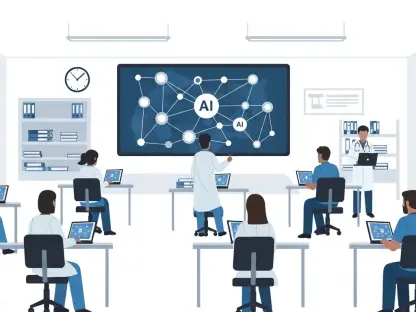In recent years, technological advancements have given rise to innovative methods for diagnosing mental health conditions. One particularly promising field involves the use of artificial intelligence (AI) and voice analysis to detect early signs of depression in older adults. This article delves into a groundbreaking initiative in Singapore, called SoundKeepers, that aims to leverage voice-based AI to identify early-stage depression among the elderly.
The SoundKeepers Initiative
Collaboration and Funding
SoundKeepers is an ambitious project funded by the Lien Foundation and involves a collaborative effort between multiple sectors. Key players include the National Healthcare Group (NHG), Nanyang Technological University (NTU), NHG Polyclinics, and the Institute of Mental Health (IMH). Several NTU Singapore schools, such as the Lee Kong Chian School of Medicine (LKCMedicine) and the College of Computing and Data Science (CCDS), are also integral to the initiative. By bringing together experts in healthcare, technology, and social services, SoundKeepers leverages diverse expertise to address the multifaceted issue of depression in older adults.
Key to the project’s success is the robust framework for cross-sector collaboration, ensuring that the initiative benefits from cutting-edge research and clinical insights. The comprehensive involvement of multiple institutions allows for a more thorough and multifaceted approach to tackling depression among the elderly. This collaborative synergy makes it possible to create an AI system that is both technologically advanced and clinically relevant.
Voice Sample Collection
The project involves collecting voice samples from over 600 elderly participants aged 55 and above who are connected to Hougang and Woodlands polyclinics. These samples are obtained through casual conversations or passage reading, then anonymized and securely stored. By analyzing various acoustic features like pitch, volume, and timbre, the AI aims to detect subtle changes linked to depression. Researchers from NTU’s LKCMedicine and CCDS are developing sophisticated algorithms to analyze these voice recordings.
Analyzing neurobiological irregularities indicative of subsyndromal depression (SSD), a precursor to full-blown depression, is a central focus. The use of acoustic features such as shimmer, jitter, and rhythm is unprecedented and exemplifies the innovative nature of this initiative. The goal is to create a robust AI model capable of identifying early signs of SSD through minor fluctuations in vocal characteristics. This proactive approach not only addresses the immediate issue but also sets a foundation for integrating more nuanced diagnostic tools into broader healthcare systems.
Community-Centric Interventions
Structured Support Programs
Beyond voice analysis, SoundKeepers includes a comprehensive 24-week community intervention program led by IMH. This program offers psychoeducation, community activities, and a befriending service. These interventions aim to mitigate early signs of depression and are delivered in collaboration with social service agencies like Fei Yue Community Services and Club HEAL. Structured support programs are designed to foster social engagement and reduce isolation among older adults.
Incorporating activities such as exercise and recreation, the community intervention seeks to improve overall well-being and create a supportive environment for participants. The psychoeducation modules aim to empower individuals by helping them recognize early symptoms of depression and providing strategies for managing these symptoms. This holistic approach addresses both the mental and physical health of participants, offering a well-rounded method for depression management and prevention.
Randomized Controlled Trial
To evaluate the effectiveness of the intervention program, NHG Polyclinics will conduct a randomized controlled trial with 300 participants. This trial will compare levels of loneliness, anxiety, well-being, and depression literacy before and after the intervention. The results will be contrasted with a control group to determine the program’s impact. The use of a randomized controlled trial ensures that the findings are robust, providing a reliable basis for evaluating the intervention’s effectiveness.
Measuring key metrics such as loneliness and anxiety, the trial will provide quantitative data to support the program’s efficacy. This evidence-based approach is crucial for substantiating the value of the SoundKeepers initiative and informing future mental health strategies. By validating the intervention’s outcomes, researchers can better understand its real-world applicability, making it possible to refine and optimize the program for broader implementation.
Implications for Mental Health Care
Focus on Subsyndromal Depression
The project targets subsyndromal depression (SSD), a less-recognized but significant health risk among seniors. SSD often goes undiagnosed and untreated, despite its high propensity to develop into full-blown depression. Early detection and intervention are key to managing SSD effectively, making it crucial in preventing more severe mental health issues and reducing long-term healthcare costs. Addressing SSD is essential for preventing progression to more severe stages of depression and ensuring timely support.
Identifying subtle linguistic markers of depression allows for timely interventions, slowing down or halting the progression of the condition. This focus aligns with broader healthcare trends emphasizing preventative care as a means to improve population health outcomes and reduce healthcare expenditures. By catching SSD early, the SoundKeepers initiative aims to mitigate the long-term impacts on both individuals and the healthcare system.
Innovating Mental Health Diagnostics
Detecting depression through vocal analysis represents a cutting-edge approach that leverages technology to enhance diagnostic accuracy. Traditional methods rely on subjective assessments, whereas AI can uncover linguistic markers that humans might miss, providing a more objective and reliable diagnosis. The integration of AI in mental health diagnostics is part of a broader trend toward using digital tools and machine learning in healthcare, promising to make diagnostics more accessible and efficient.
These technologies hold significant promise for revolutionizing the way mental health conditions are diagnosed, making it possible to identify issues earlier and more accurately. Moreover, the potential to scale these innovations and integrate them into existing healthcare systems opens new avenues for improving mental health care. Combining technology with traditional healthcare practices offers a comprehensive approach that could significantly enhance the quality of mental health diagnostics and treatment.
Future Aspirations
Scalability and Integration
One of the long-term goals of SoundKeepers is to integrate its findings and tools into Singapore’s national mental health infrastructure. Plans include scaling the project to encompass more polyclinics, general practitioner clinics, and broader participant cohorts. If successful, this initiative could serve as a model for other regions. The scalability of the project ensures that its benefits extend beyond the initial participant group.
By integrating AI diagnostic tools into existing healthcare frameworks, SoundKeepers aims to create a sustainable and scalable model for early depression detection. Future aspirations include leveraging the project’s success to build a nationwide network, creating a more cohesive and extensive mental health care system. This holistic approach ensures that the initiative can reach a larger population, providing essential support to those at risk of depression, potentially improving the quality of life for thousands.
Expanding on Community Integration
SoundKeepers seeks to maintain scalability and future integration into Singapore’s national mental health infrastructure through existing community programs like CREST and COMIT. If successful, the project could extend its reach to more polyclinics, general practitioner clinics, and broader participant cohorts.
Integrating the project’s findings into established community programs ensures that the initiative remains accessible and relevant. SoundKeepers is set to provide a sustainable, community-based model for detecting and managing early-stage depression. By working within existing frameworks, it aims to deliver significant improvements in mental health care, offering a template that can be adapted and implemented globally. This community-centric approach builds on the foundation of social support and collective action, ensuring long-term viability and effectiveness.
Conclusion
Recent technological advancements have paved the way for innovative approaches to diagnosing mental health conditions. One particularly promising area is the use of artificial intelligence (AI) and voice analysis to detect early signs of depression, especially in older adults. This article explores a groundbreaking initiative in Singapore known as SoundKeepers, which aims to use voice-based AI technology to identify early-stage depression in the elderly.
SoundKeepers leverages AI algorithms to analyze vocal patterns, tone, and speech nuances to flag potential depressive symptoms. Traditional methods of diagnosing depression often rely on self-reported data and may not capture subtle emotional cues, making early detection challenging. However, AI-driven voice analysis can monitor and evaluate these nuances with greater precision and consistency.
By focusing on older adults, SoundKeepers addresses a vulnerable population often underserved in mental health services. This innovative approach not only promises to enhance early detection but also aims to destigmatize mental health issues by offering a non-invasive, user-friendly diagnostic tool, ultimately improving the overall well-being of the elderly.









